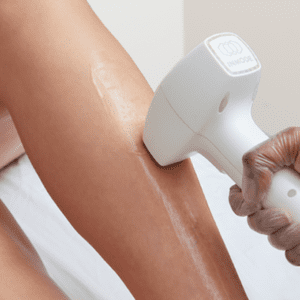Stress Incontinence
Stress Urine Incontinence can be treated through confidence-building regimens for control.
Stress Urine Incontinence (SUI) affects one in three women yet most cases remain untreated. Stress incontinence occurs when urine leaks unintentionally because of physical activities which put strain on the bladder during actions like laughing sneezing coughing exercising or chair standing.
Rasa Derm believes that your life should not be restricted by leakages. Your life deserves to be free from leaks no matter your age whether you are in your 30s or have given birth or entered menopause. Our organization offers non-surgical procedures that enhance both pelvic strength and bladder management through methods that do not require surgery or medicine or time for recovery.
The deterioration of bladder and urethra supporting tissues along with muscles produces stress incontinence. The pelvic floor together with the urethral sphincter normally keeps urine inside the bladder even during stressful situations. The urethra fails to stay shut during pressure due to damaged supports which leads to leakage. The primary cause of stress incontinence is bladder pressure from physical sources rather than psychological or emotional stress.
Small everyday activities can cause urine leaks among women:
- Sneezing or coughing.
- Having a good laugh.
- Running or jumping.
- Taking up hefty objects.
- Abruptly getting up or sitting down.
- Taking groceries or kids.
- Having sex.
The extent of the issue determines the amount of urine leak from a few drops to larger amounts among women.
Stress incontinence occurs because of multiple factors that damage pelvic floor muscles or nerves controlling bladder regulation.
Pregnancy always creates bladder pressure due to uterine expansion. The pelvic floor muscles together with connective tissues become extended or damaged when women deliver vaginally. Birth-related nerve damage can result in delayed postpartum incontinence while causing muscle impairment that leads to leaks immediately after delivery or years later.
The natural process of aging causes women to lose their estrogen production particularly after they reach menopause. The vaginal and urinary tissues depend on estrogen for maintaining their strength and thickness. The reduction of this hormone leads to:
- Weaker and thinner pelvic tissues.
- Decreased urethral wall elasticity.
- Loss of natural lubricant and dryness.
- Reduced muscular tone, which causes leakage.
Hysterectomy together with other surgeries that touch the uterus and ovaries and bladder can unintentionally modify the normal pelvic floor structure. Surgery-created scar tissue combined with nerve injuries diminishes the amount of support needed for the urethra to maintain continence.
The pressure on the bladder increases when a person has excessive body fat. The pelvic support weakens when women perform hard lifting repeatedly or experience asthma or smoking-related coughing or experience prolonged constipation.
Some women have inherited conditions which affect collagen production and connective tissue health. lifestyle choices like:
- Smoking (which alters estrogen and destroys connective tissue).
- Being sedentary.
- High-impact sports that lack pelvic training can accelerate the development of incontinence
Stress incontinence presents no major health threats yet it creates psychological and social difficulties for patients:
- The continuous fear of leaking in public spaces causes constant distress.
- The avoidance of physical activities extends to workout avoidance and workout restriction.
- Carrying additional clothing or pads as a precaution when moving around.
- Embarrassment in intimate situations.
- Anxiety, loneliness, or a disturbed sense of self-worth.
- The illness creates negative effects on your relationships as well as your independence and quality of life.
The good news, though? It is curable, frequently without the need for surgery.
Visit Rasa Derm or speak with a physician when you experience the following symptoms:
- Urine leaks occur when you perform daily activities such as lifting or laughing or coughing.
- Your fear of urine leaks causes you to stay away from social activities and physical exercise.
- Frequent use of absorbent pads along with concerns about urine smell combined with pelvic or vaginal area looseness or loss of sensation.
- You are searching for a non-surgical procedure which is both safe and will help you gain control again.
- Your core strength together with bladder strength has not fully recovered since childbirth.
Our non-surgical and minimally invasive treatments at Rasa Derm target the fundamental causes of stress urinary incontinence which include weak pelvic floor muscles together with collagen depletion and decreased bladder and urethra support. Our advanced intimate wellness technologies help restore pelvic floor strength and tone while providing control without requiring any period of recovery or causing discomfort.

Radiofrequency Vaginal Tightening (RF Therapy)
This treatment uses gentle radiofrequency energy to heat the vaginal tissues.
- Session Duration: 20-30 minutes
- Sessions Required: 3–4 sessions
- Gaps Between Sessions: Every 3–4 weeks
- Results In: Progressive improvement in bladder control, tightness, and dryness in 6–12 weeks D

Fractional CO₂ or Er:YAG Laser Vaginal Rejuvenation
This laser treatment gently resurfaces the vaginal lining using fractional technology.
- Session Duration: 15-20 minutes
- Sessions Required: 3 sessions
- Gaps Between Sessions: Every 4–6 weeks
- Results In : Visible improvement in tightness, bladder control, and vaginal dryness in 4–8 weeks

PRP (Platelet-Rich Plasma) Intimate Rejuvenation
This procedure uses platelet-rich plasma from your own blood, injected.
- Session Duration: 30–40 minutes
- Sessions Required: 1-2 sessions
- Gaps Between Sessions: Once every 6–12 months (as maintenance)
- Results In : Improved sensitivity, lubrication, and orgasmic function in 4–6 weeks

Pelvic Floor EMS (Kegel-Like Muscle Re-Training)
This non-invasive, chair-based treatment uses high-intensity electromagnetic stimulation (HIFEM).
- Session Duration: 30 minutes
- Sessions Required: 6–8 sessions
- Gaps Between Sessions: 2 sessions per week
- Results In : Improved muscle tone and bladder control in 4–6 weeks








